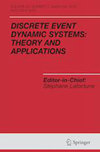The journal publishes high-quality peer-reviewed papers on the modeling and control of discrete event dynamical systems (DEDS). Such systems are engineering and mathematical models of for example manufacturing plants communication and computer networks management information databases command-control-communication systems and other man-made operational systems. The scope of the journal is defined by its emphasis on the modeling of discrete events by dynamic systems and on problems of their control and optimization. The development of the theory of DEDS must continuously be motivated by concrete problems and so the journal welcomes papers describing modeling and control problems with discrete events from all areas of engineering and science. The term 'problem' is interpreted here in a broad sense to include not only problems from the real world but also well-defined problems arising from a methodological context. As a scientific and engineering discipline DEDS must have both experimental and theoretical components. Carefully designed experiments accumulate evidence upon which a relevant theory can be built. Conversely analytical and mathematical reasoning pinpoint further experiments to be conducted for theory validation and extension. The journal encourages papers which emphasize this interplay between modeling experimentation and mathematical theory. It is not devoted exclusively to the mathematics of DEDS. The journal provides a science and engineering knowledge base for studies of DEDS. The journal's content covers three broad areas: theory and formal models performance analysis and control and applications. Within those broad areas papers are published specifically devoted to the dynamics of discrete event systems control and optimization and the interface with operations research and computer science.
